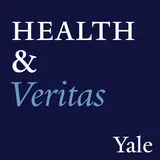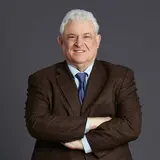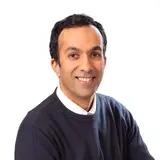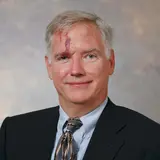
Health & Veritas
Howard Forman and Harlan Krumholz, two Yale physician-professors, discuss the latest news and ideas in healthcare and seek out the truth amid the noise.
Health & Veritas is produced with the Yale School of Management and the Yale School of Public Health. New episodes are available every Thursday.
Subscribe to Health & Veritas on Apple Podcasts, Spotify, YouTube or your favorite podcast player.

Howard P. Forman
Professor of Radiology and Biomedical Imaging, Economics, Public Health, and Management; Co-founder, Pozen-Commonwealth Fund Fellowship in Health Equity Leadership, MD/MBA Program, and MBA for Executives Program
Read bio
Professor Forman is a Professor of Diagnostic Radiology (and faculty director for Finance), Public Health (Health Policy), Economics and Management. Professor Forman directs the Health Care management program in the Yale School of Public Health and teaches healthcare economics in the Yale College Economics Department. He is the faculty founder and director of the MD/MBA program as well as the faculty director of the healthcare focus area in the School of Management’s MBA for Executives program. He is the co-founder and special advisor to the Pozen-Commonwealth Fund Fellowship in Health Equity Leadership program. He co-hosts the Health & Veritas podcast with Dr. Harlan Krumholz.
As a practicing emergency/trauma radiologist, he is actively involved in patient care and issues related to financial administration, healthcare compliance, and contracting. His research has been focused on improving imaging services delivery through better access to information. He has worked as a health policy fellow in the U.S. Senate, on Medicare legislation.
During the COVID Pandemic, Professor Forman has actively tracked outbreaks at local, national, and international levels; expounding on mitigation strategies and engaging to dispel misinformation through social and print media. He has been a frequent guest commentator and expert on national video and audio platforms.

Harlan M. Krumholz
Harold H. Hines, Jr. Professor of Medicine and Professor in the Institute of Social Policy Studies, of Investigative Medicine, and of Public Health (Health Policy); and Director of the Yale Center for Outcomes Research and Evaluation
Read bio
Harlan Krumholz is a cardiologist and scientist at Yale University and Yale New Haven Hospital. He is the Harold H. Hines, Jr. Professor of Medicine, and Professor in the Institute of Social Policy Studies, of Investigative Medicine, and of Public Health (Health Policy), and the Director of the Yale Center for Outcomes Research and Evaluation. He is a leading expert in the science to improve the quality and efficiency of care, eliminate disparities and promote equity, improve integrity and transparency in medical research, engage patients in their care, and avoid wasteful practices. Recent efforts are focused on harnessing the digital transformation in healthcare to accelerate knowledge generation and facilitate the delivery of care aligned with each patient’s needs and preferences.
Dr. Krumholz is director of the Yale New Haven Hospital Center for Outcomes Research and Evaluation (CORE), an organization dedicated to improving health and health care through research, tools, and practices that produce discovery, heighten accountability and promote better public health and clinical care. He co-founded and co-leads the Yale University Open Data Access (YODA) Project, designed to increase access to clinical research data and promote their use to generate new knowledge. He also co-founded and co-leads medRxiv, a non-profit preprint server for the medical and health sciences. He was a founding faculty co-director of the Yale Center for Research Computing.
Dr. Krumholz has been honored by membership in the National Academy of Medicine, the Association of American Physicians, and the American Society for Clinical Investigation. He was named a Distinguished Scientist of the American Heart Association and received their Award of Meritorious Achievement and their Clinical Research Prize. He served as a member of the Advisory Committee to the Director of the National Institutes of Health. Dr. Krumholz received the Friendship Award from the People’s Republic of China in recognition of his collaborative efforts to develop a national cardiovascular research network and was named by the Chinese Society of Cardiology as a Top-10 Distinguished International Cardiologist for his contributions to the development of cardiovascular medicine in China. He founded the American Heart Association’s Quality of Care and Outcomes Research Council and co-founded their annual conference. He was the founding editor of Circulation: Cardiovascular Quality and Outcomes; founding editor of CardioExchange, a social media site of the publisher of the New England Journal of Medicine; and editor of Journal Watch Cardiology of the New England Journal of Medicine. He was a founding Governor of the Patient-Centered Outcomes Research Institute.
Episodes

Arthur Caplan: Medicine’s Toughest Ethical Questions
Howie and Harlan are joined by Arthur Caplan, Drs. William F. and Virginia Connolly Mitty Professor of Bioethics and founding head of the division of medical ethics at NYU Grossman School of Medicine, to discuss the ethical failings of the pharmaceutical industry and how a community-focused ethos prioritizing justice and protection of the vulnerable would have reshaped the COVID response. Harlan reports on developments in synthetic proteins. Howie recognizes World Malaria Day.

Scott Berkowitz: Value-Based Care and Population Health
Howie and Harlan are joined by Scott Berkowitz ’03, cardiologist and chief population health officer at Johns Hopkins Medicine, to discuss the necessity of moving from fee-for-service to value-based care delivery to improve outcomes for all. Harlan highlights the dangers of misinformation about Ivermectin. Howie reports on the potential conflicts of interest created by device manufacturers’ payments to cardiologists.

Atheendar Venkataramani: Opportunity, Hope, and Health
Howie and Harlan are joined by Atheendar Venkataramani, a physician, health economist, and director of the Perelman School of Medicine’s Opportunity for Health Lab, to discuss the powerful role of economic opportunity in population health outcomes. Harlan reports on two studies where treatments’ unexpected benefits leapt ahead of understanding why they work. Howie reflects on the business model of the pharma industry and the market reaction to anti-obesity drugs.

Kate McEvoy: How Medicaid Is Driving Healthcare Innovation
Howie and Harlan are joined by Kate McEvoy, executive director of the National Association of Medicaid Directors, to discuss the programs’ underappreciated advances in holistically addressing health, housing, and food security. Reflecting on the upcoming election, Harlan notes that facts matter, whether in medicine or politics. Howie reports on the dangers of glyoxylic acid in hair straightening products.

Margo Harrison: Women’s Health as a Path to Empowerment
Howie and Harlan are joined by Margo Harrison, an OB-GYN and femtech entrepreneur, to discuss how innovative solutions to women’s health problems offer deeper understanding and expanded choices. Harlan and Howie each offer a caveat emptor for lightly regulated, unproven supplements and treatments such as Prevagen and hydration spas.

Zack Cooper: High Healthcare Costs: Who Pays, Who Benefits
Howie and Harlan are joined by Yale health economist Zack Cooper to discuss his work on surprise medical bills and the impact of high healthcare costs on households, wages, and the economy. Harlan reports on Hippocratic AI’s efforts to develop AI nurses. Howie looks at the global effort to eradicate tuberculosis.

Robert Alpern: Creating an Inspired Medical School
Howie and Harlan are joined by Robert Alpern, a Yale nephrologist and the former dean of the Yale School of Medicine, to discuss the importance of a fiscal base for enabling a medical school to deliver top-quality training, research, and clinical care. Harlan asks whether widespread norovirus is a reason to call it quits on shaking hands. Howie reports on a study of the increased mortality among those with ADHD.

Robert Rohrbaugh: Bringing Antiracist Tools to Clinical Practice
Howie and Harlan are joined by Robert Rohrbaugh, professor of psychiatry and deputy dean for professionalism and leadership at the Yale School of Medicine, to discuss his work training doctors in antiracist practices and ensuring the wellbeing of clinicians during the pandemic. Harlan reports on the problematic history of medical journals promoting eugenics; Howie highlights a cyberattack that has paralyzed Change Healthcare, the country’s largest payments processing hub.

A Cheating Scandal, Abandoned Research, and Other News
Howie and Harlan discuss health and healthcare headlines, including a cheating scandal that has led to the invalidation of hundreds of scores from Nepal on the U.S. Medical Licensing Examination, the problem of research that never sees the light of day, new anti-obesity medications, and Florida’s unorthodox approach to measles.

Lucila Ohno-Machado: AI and the Art of Medicine
Howie and Harlan are joined by Lucila Ohno-Machado, the Yale School of Medicine’s deputy dean for biomedical informatics. She explains how expanding use of data science, informatics, AI, and technology could enable doctors to spend more time with patients. Harlan celebrates mentorship while marking the death of Irwin Birnbaum, a mentor to many in his time as COO of the Yale Medical School and long after retiring. Howie discusses the mixed evidence from a study on vaping as a tool for helping cigarette smokers quit.
